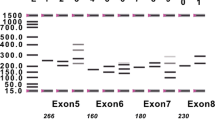Abstract.
Introduction: The c-K-ras2-gene (K-ras) encodes the p21ras protein, which participates in the transduction of mitogenic signals from the cell surface to the nucleus. About 40–50 % of colorectal cancers bear a point mutation of the K-ras codon 12 within exon I, leading to activation of the K-ras oncogene. Methods: Using a polymerase chain reaction (PCR)-based two-step restriction fragment length polymorphism (2sRFLP)-technique, we assessed the frequency of point mutations in the first or second base of K-ras codon 12 in patients suffering from colorectal carcinoma, adenoma, and their normal colon mucosa, respectively. Results: Similar to other investigators, we found mutations in 7 out of 17 (41 %) colorectal carcinomas and 1 out of 4 (25 %) adenomas. Using this very sensitive 2sRFLP technique (detection level = 0.2 % of mutated cells), we were able to find K-ras codon 12 mutations in normal mucosa in 4 out of 18 (22.2 %) patients with colorectal neoplasia. Conclusions: This result can be explained by the phenomenon of “field cancerization” or by a local micrometastasis of K-ras-positive tumor cells.
Zusammenfassung.
Einleitung: Das c-K-ras2-Gen (kurz: K-ras) codiert für das p21ras-Protein, welches an der Transduktion mitogener Signale von der Zelloberfläche zum -kern beteiligt ist. Etwa 40–50 % der colorectalen Carcinome zeigen Punktmutationen des K-ras-Codon-12 im Exon I, die zur Aktivierung des K-ras-Onkogens führen. Methoden: Wir verwendeten eine PCR-gestützte 2-Schritt-Restriktionsfragment-Längenpolymorphismus- (2sRFLP) Technik zum Nachweis einer Punktmutation der ersten beiden Basen des K-ras-Codon-12 in colorectalen Carcinomen, Adenomen und normaler Mucosa von Patienten mit colorectalen Neoplasien. Ergebnisse:Ähnlich wie andere Autoren fanden wir eine Mutation bei 7 von 17 (41 %) colorectalen Carcinomen und einem von 4 (25 %) Adenomen. Mit der sensitiven 2sRFLP (Nachweisgrenze = 0,2 % mutierte Zellen) gelang uns in 4 von 18 (22,2 %) Proben normaler Mucosa von Patienten mit colorectaler Neoplasie ebenfalls der Mutationsnachweis. Schlußfolgerungen: Dies kann entweder durch das Phänomen der „field cancerization“ oder eine Mikrometastasierung K-ras-positiver Tumorzellen erklärt werden.
Similar content being viewed by others
Author information
Authors and Affiliations
Rights and permissions
About this article
Cite this article
Aivado, M., Gynes, M., Gorelov, V. et al. „Field cancerization“– ein zusätzliches Phänomen in der Entwicklung von Colontumoren? K-ras-Codon-12-Mutationen in normaler Colonmucosa von Patienten mit colorectalen Neoplasien. Chirurg 71, 1230–1235 (2000). https://doi.org/10.1007/s001040051207
Published:
Issue Date:
DOI: https://doi.org/10.1007/s001040051207




